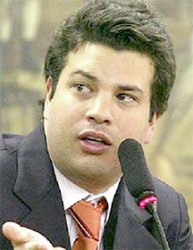BRASILIA, (Reuters) – President Dilma Rousseff can no longer count on a key ally in her ruling coalition, complicating efforts to stave off what could be the roughest patch for Brazil’s economy in a quarter-century.
Leaders of the Brazilian Democratic Movement Party (PMDB), the biggest party in Rousseff’s coalition, blame her for their inclusion in a probe of politicians allegedly involved in a massive corruption scheme at state-run oil company Petrobras.
PMDB legislators told Reuters they expect the dispute to get even messier in coming weeks, making them less likely to support Rousseff’s efforts to cut Brazil’s budget deficit and restore investor confidence in the struggling economy.

“Their passage will be tough. They are very controversial measures that affect the rights of workers,” Leonardo Picciani, the PMDB leader in the Chamber of Deputies, said of two initiatives that would save the government about 18 billion reais ($5.74 billion) a year by tightening access to pension and unemployment benefits.
“The government will have to convince us they are really needed,” Picciani told Reuters.
While few expect the PMDB to formally break with Rousseff’s leftist Workers’ Party in coming months, such open resistance to her legislative proposals adds to her long list of political and economic problems.
The economy is expected to shrink at least 0.6 percent this year, inflation is running well above 7 percent, a widespread drought has raised the possibility of water and power rationing, and public anger is rising over the corruption scandal at Petroleo Brasileiro SA, as Petrobras is formally known.
The PMDB, which has its roots in Brazil’s return to democracy in the 1980s but no clear ideology, holds more seats in Congress than any other party, including a quarter of the Senate.
Rousseff’s vice president, Michel Temer, is also from the PMDB.
The party’s reputation for allying itself with whomever is in government, in order to reap power and other spoils, runs so deep that a satirical magazine joked during last year’s tight presidential election runoff that the PMDB would endorse both Rousseff and her centrist opponent.
The cause for the party’s anger with Rousseff is disputed. Officials in Rousseff’s government have denied any role in pressuring a prosecutor to include PMDB leaders on a list of 47 politicians under investigation in the Petrobras scandal.
Nevertheless, since the list was released last week, PMDB leaders have vented their anger at Rousseff and effectively shelved an increase in payroll taxes that was a pillar of her austerity plans.
The politicians being investigated may face charges and a trial in months and years to come, making more conflict likely. “I don’t see an end to this crisis. It is not just any crisis. The Petrobras case has become the biggest scandal in Brazilian history,” PMDB Senator Ricardo Ferraco told Reuters.
ROUSSEFF TRIES TO FIX DAMAGE
Brazil’s currency has fallen 9 percent this month and 15 percent since the start of the year as investors fear the government could be forced to abandon austerity and Brazil might lose its coveted investment grade credit rating.
Rousseff, a career bureaucrat who has struggled in the art of coalition building since taking office in 2011, is scrambling to defuse the crisis, or at least prevent it from further damaging the economy.
First, she met with Temer on Monday, prompting a wave of conciliatory comments from party leaders.
On Tuesday, she sent her finance minister Joaquim Levy to negotiate with the PMDB speakers of both chambers of Congress. Levy compromised and reached a deal on income tax bracket changes, although it was less than the government had sought and leaders on both sides say the wounds are far from healed.
The next battle will be over the two presidential decrees that need Congres-sional approval to set stricter rules for accessing unemployment and pension benefits.
PMDB lawmakers also say they will call the Workers’ Party’s treasurer in to testify in a congressional investigation of the Petrobras scandal to examine whether any of the bribe money was used to fund Rousseff’s election campaign.
The dispute runs beyond the Petrobras case.
PMDB leaders complain the Workers’ Party poured its resources into helping just its own candidates in the 2014 elections. And when Rousseff was elected with its help, the PMDB was miffed it did not get meatier positions in her cabinet.Worse, now that there is an economic crisis, they complain Rousseff is coming to the PMDB to help pass unpopular belt-tightening measures that even her own party does not support.






